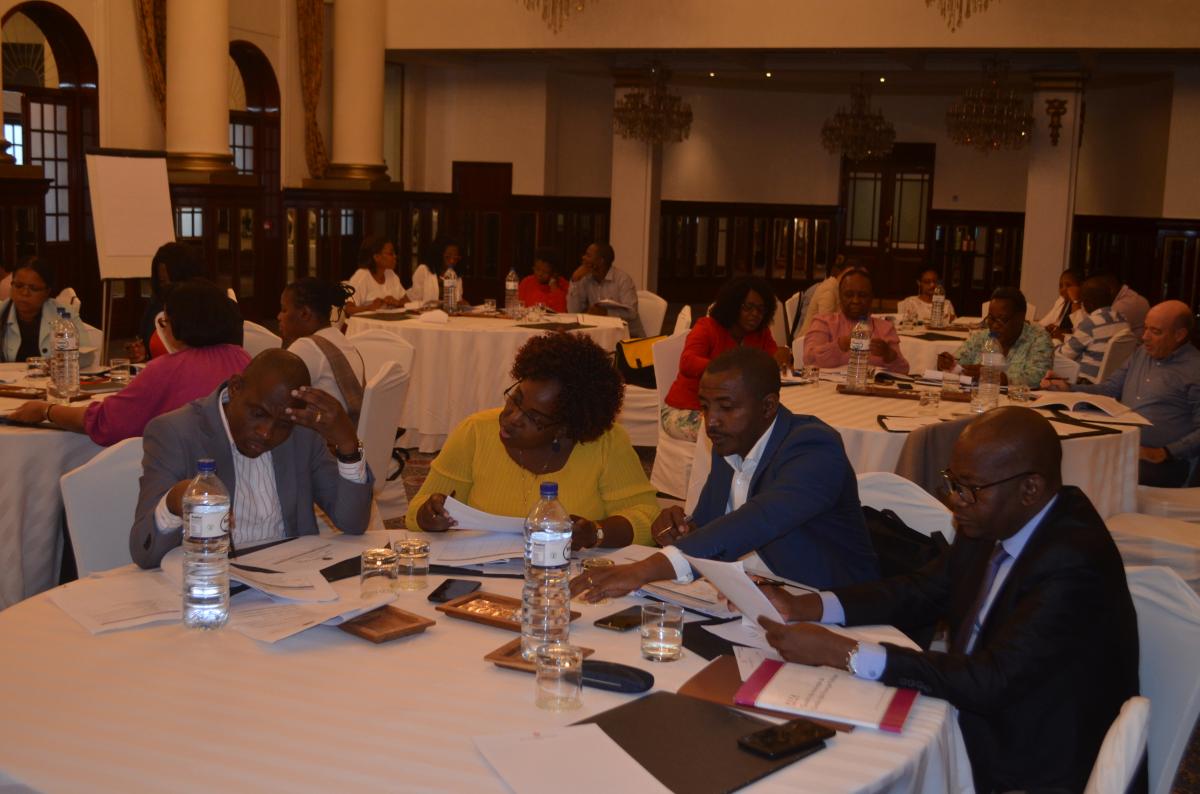PEFA 2019 seminar assessment launch and workshop on Mozambique’s health sector
By: J. Waterschoot and D. Stella
The Ministry of Health and the Development
Partners agreed upon a harmonised PFM analysis plan. The Memorandum of
Understanding (MoU) for the Health sector common fund, known as PROSAUDE, foresaw
a PFM analysis plan that became the basis of the Harmonised plan; The MoU
requires a Public Expenditure and Financial Accountability (PEFA) assessment
to be conducted in 2019, which provides evidence to drive reforms for improving
health expenditure efficiency. For the 2019 PEFA Assessment, Enabel,
jointly with the Swiss Development Cooperation, funded this assessment.
The Government of Flanders is a cooperation
partner of the Ministry of Health and the Mozambican health sector. The Government
of Flanders also funds the GTAF3 project, and through Enabel, it provides, technical
assistance in Public Financial Management for the sector. Enabel decided to
invest some of GTAF3 funds in a Public Expenditure and Financial Accountability
(PEFA) evaluation of the health sector, which will provide information about the
sector’s PFM performance. As such, the PEFA is the measure that will tell
whether there was progress, it takes the system’s “temperature”. As mentioned
in the introduction, the PEFA assessment is a specific requirement of the MoU for the
PROSAUDE Common Fund and is part of the Harmonised PFM analysis plan agreed
between the Ministry of Health and the Development Partners. Thus far, 2
PEFA assessments of the health sector have been made in Mozambique, with the
previous evaluation dating back to 2015. The new evaluation covers the period 2016
to 2018, that is, the last three years with consolidated accounting information
and uses the ‘PEFA 2016’ methodology. It will help gauge the progress done
since then.
A PEFA is an evaluation
of a country’s public financial management performance. The methodology can be
applied to assess the central government’s financial management or the
performances of lower levels of government. It assesses the strengths and
weaknesses of pubic financial management and provides a complete and consistent
analysis, using quantitative and
qualitative indicators measuring performances.
Considering
that the purpose of a PFM system is to guarantee fiscal discipline and ensure
strategic allocation of resources for efficient services, the PEFA methodology
measures how the PFM system fulfills this purpose. As such, a PEFA assessment
provides a country with an analytical and detailed tool to discuss the performance in managing public finances
and assesses the extent in which PFM systems, processes and institutions
perform against the standards for each one of the seven pillars that constitute
the PEFA framework (for details on the PEFA framework please refer to the official
web page www.pefa.org). For this PEFA, the Standard Methodology 2016 needed
to be adapted to a sector evaluation.
The consultants that were awarded the contract proposed a selection of 23 out
of 31 indicators.
A PEFA evaluation includes a
launching seminar, with the aim of familiarising government officials and other stakeholders
with the PEFA methodology. This seminar was held on March 18th, 2020
and organised by a team of international and local consultants. The team leader could not be present due to
the Covid-19 travelling restrictions. Nonetheless, with a clearly structured
presentation, the local consultants explained the PEFA methodology and its
indicators, and informed stakeholders on the purpose of the evaluation
and about the future use of its results. In
addition, the consultants explained the rational of the selection of indicators,
highlighting the relevance of the choice made. The audience were mainly
government officials working in various directorates and institutions in the health
sector. Officials from the Ministry of Economy and Finance also participated,
as well as members of the donor community and from civil society organisations.
Through participative discussions and group exercises on PEFA, this training
provided participants with an insight of the tools and the framework to analyse
the sector’s public financial management. In addition, it would provide the
criteria to design reforms to meet the recommended underlying standard
considered for a PEFA evaluation to strengthen the management of public
finances. The ultimate objective is to provide the sector with improved PFM
systems which, in turn should result in better health outcomes.
After the
introduction to the PEFA methodology and indicators, the participants to the workshop
were involved in a group exercise. Each group was assigned a PEFA pillar, for
which they had to identify the strong and weak points in the Mozambican Health
sector and formulate further recommendations for possible or necessary reforms.
This active way of learning made the information and possibilities of a PEFA
assessment easier to digest, especially considering that most of the participants
did not have experience with a PEFA assessment before this seminar.
A
PEFA aims at improving PFM and its credibility. Therefore, by taking a snapshot
of the PFM performances in all components (planning, budgeting, executing,
accounting and reporting, assets management, audit and control and oversight
indicators in the cluster SDG16), it is possible to lay a path for improving
the performances. Thus, it can be
expected that the production of services will ultimately improve performances
helping progress in Health service delivery outcomes indicators clustered in
SDG3.
With the launching seminar, the PEFA 2019
assessment officially started. There are several next steps in the PEFA
evaluation. The preparatory report has been completed, while the final report
is scheduled by the end of August (not considering the delays that the current pandemic
can introduce). Through this seminar, government officials had a primary introduction
to the PEFA and the purposes it serves. The workshop wanted to prepare the
grounds for the following stages of the assessment that is the data collection basis
for the evaluation. Enabel hopes that the final PEFA report and the seminar
will give officials an instrument to measure PFM progress in their sector. As
such, participants will be able to use the evaluation, its conclusions and
recommendations for implementing further PFM reforms in the sector.
Dernières actualité de ce projet
Pas d'actualité

